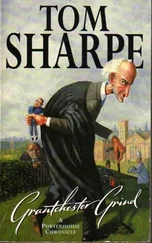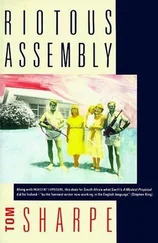Tom Sharpe - Porterhouse Blue
Здесь есть возможность читать онлайн «Tom Sharpe - Porterhouse Blue» весь текст электронной книги совершенно бесплатно (целиком полную версию без сокращений). В некоторых случаях можно слушать аудио, скачать через торрент в формате fb2 и присутствует краткое содержание. Жанр: Современная проза, на английском языке. Описание произведения, (предисловие) а так же отзывы посетителей доступны на портале библиотеки ЛибКат.
- Название:Porterhouse Blue
- Автор:
- Жанр:
- Год:неизвестен
- ISBN:нет данных
- Рейтинг книги:4 / 5. Голосов: 1
-
Избранное:Добавить в избранное
- Отзывы:
-
Ваша оценка:
- 80
- 1
- 2
- 3
- 4
- 5
Porterhouse Blue: краткое содержание, описание и аннотация
Предлагаем к чтению аннотацию, описание, краткое содержание или предисловие (зависит от того, что написал сам автор книги «Porterhouse Blue»). Если вы не нашли необходимую информацию о книге — напишите в комментариях, мы постараемся отыскать её.
Porterhouse Blue — читать онлайн бесплатно полную книгу (весь текст) целиком
Ниже представлен текст книги, разбитый по страницам. Система сохранения места последней прочитанной страницы, позволяет с удобством читать онлайн бесплатно книгу «Porterhouse Blue», без необходимости каждый раз заново искать на чём Вы остановились. Поставьте закладку, и сможете в любой момент перейти на страницу, на которой закончили чтение.
Интервал:
Закладка:
“Yes, sir,” Skullion said, but without, it seemed to the Dean, the enthusiasm that had been his wont.
“Getting old, poor fellow,” the Dean thought as he stumbled past the red lanterns that guarded the fallen debris of Zipser’s climacteric.
Chapter 13
Cornelius Carrington travelled to Cambridge by train. It accorded with the discriminating nostalgia which was the hallmark of his programmes that he should catch the Fenman at Liverpool Street and spend the journey in the dining-car speculating on the suddenness of Sir Cathcart’s invitation, while observing his fellow travellers and indulging in British Rail’s high tea. As the train rattled past the tenements and factories of Hackney and on to Ponders End, Carrington recoiled from the harshness of reality into the world of his own choosing and considered whether or not to have a second toasted tea cake. His was a soft world, fuzzy with private indecisions masked by the utterance of public verities which gave him the appearance of a lenient Jeremiah. It was a reassuring image and a familiar one, appearing at irregular but timely intervals throughout the year and bringing with it a denunciation of the present, made all the more acceptable by his approval of the recent past. If pre-stressed concrete and high-rise apartments were anathemas to Cornelius Carrington, to be condemned on social, moral and aesthetic grounds, his adulation of pebbledash, pseudo-Tudor and crazy paving asserted the supreme virtues of the suburbs and reassured his viewers that all was well with the world in spite of the fact that nearly everything was wrong. Nor were his crusades wholly architectural. With a moral fervour which was evidently religious, without being in any way denominational, he espoused hopeless causes and gave viewers a vicarious sense of philanthropy that was eminently satisfying. More than one meths drinker had been elevated to the status of an alcoholic thanks to Carrington’s intervention, while several heroin addicts had served an unexpected social purpose by suffering withdrawal symptoms in the company of Carrington, the camera crew, and several million viewers. Whatever the issue, Cornelius Carrington managed to combine moral indignation with entertainment and to extract from the situation just those elements which were most disturbing, without engendering in his audience a more than temporary sense of hopelessness which his own personality could render needless. There was about the man himself a genuinely comforting quality, epitomizing all that was sure and certain and humane about the British way of life. Policemen might be shot (and if his opinion was anything to go by they were being massacred daily across the country) but the traditions of the law remained unimpaired and immune to the rising tide of violence. Like some omniscient Teddy Bear, Cornelius Carrington was ultimately comforting.
As he sat in the dining car savouring the desultory landscape of Broxbourne, Carrington’s thoughts turned from teacakes to the ostensible reasons for his visit. Sir Cathcart’s invitation had come too abruptly both in manner and in time to convince him that it was wholly ingenuous. Carrington had listened to the General’s description of the recent events in Porterhouse with interest. His ties with his old college had been tenuous, to put it mildly, and he shared with Sir Godber some unpleasant memories of the place and his time as an undergraduate. At the same time he recognized that the changes Sir Cathcart regretted in other colleges and feared in Porterhouse might have a value for a series on Cambridge. Carrington on Cambridge. It was an excellent title and the notion of a personal view of the University by “An Old Freshman” appealed to him. He had declined the General’s invitation and had come unannounced to reconnoitre. He would visit Porterhouse, certainly, but he would stay more comfortably at the Belvedere Hotel. More comfortably and less fettered by obligation. No one should say that Cornelius Carrington had bit the hand that fed him.
By the time the train reached Cambridge, he had already begun to organize the programme in his mind. The railway station would make a good starting point and one that pointed a moral. It had been built so far from the centre of the town on the insistence of the University Authorities in 1845 who had feared its malign influence. Foresight or the refusal to accept change? The viewer could take his pick. Carrington was impartial. Then shots of College gateways. Eroded statues. Shields. Heraldic animals. Chapels and gilded towers. Gowns. Undergraduates. The Bridge of Sighs. It was all there waiting to be explored by Carrington at his most congenial.
He took a taxi and drove to the Belvedere Hotel. It was not what he remembered. The old hotel, charming in a quiet opulent way, was gone and in its place there stood a large modern monstrosity, as tasteless a monument to commercial cupidity as any he had ever seen. Cornelius Carrington’s fury was aroused. He would definitely make the series now. Rejecting the anonymous amenities of the Belvedere, he cancelled his room and took the taxi to the Blue Boar in Trinity Street. Here too things had changed, but at least from the outside the hotel looked what it had once been, an eighteenth-century hostelry, and Carrington was satisfied. After all, it is appearances that matter, he thought as he went up to his room.
At any previous time in his life Skullion would have agreed with him but now that his house in Rhyder Street was up for sale, and the College’s reputation threatened by the Master’s flirtation with the commercial aspects of birth control, Skullion was less concerned with appearances. He skulked in the Porter’s Lodge with a new taciturnity in marked contrast to the gruff deference he had accorded callers in the past. No longer did he appear at the door to greet the Fellows with a brisk “Good morning, sir” and anyone calling for a parcel was likely to be treated to a surly indifference and a churlishness which defeated attempts at conversation. Even Walter, the under-porter, found Skullion difficult. He had never found him easy but now his existence was made miserable by Skullion’s silence and his frequent outbursts of irritation. For hours Skullion would sit staring at the gas fire mulling over his grievances and debating what to do. “Got no right to do it,” he would suddenly say out loud with a violence that made Walter jump.
“No right to do what?” he asked at first.
“None of your business,” Skullion snapped back and Walter gave up the attempt to discuss whatever it was that had put the Head Porter’s back up. Even the Dean, never the most sensitive of men when it came to other people’s feelings, noticed the change in Skullion when he called each morning to make his report. There was a hangdog look about the Porter that caused the Dean to wonder if it wasn’t time he was put down before recalling that Skullion was after all a human being and that he had been misled by the metaphor. Skullion would sidle into the room with his hat in his hand and mutter, “Nothing to report, sir,” and sidle out again leaving the Dean with a sense of having been rebuked in some unspoken way. It was an uncomfortable feeling after so many years of approval and the Dean felt aggrieved. If Skullion couldn’t be put down, it was perhaps time he retired before this new churlishness tarnished his previously unspotted reputation for deference. Besides, the Dean had enough to worry about in Sir Godber’s plans without being bothered with Skullion’s private grievances.
If Skullion accorded the Dean scant respect, his attitude to the other Fellows was positively mutinous. The Bursar in particular suffered at his hands, or at least his tongue, whenever he had the misfortune to have to call in at the Porter’s Lodge for some unavoidable reason.
Читать дальшеИнтервал:
Закладка:
Похожие книги на «Porterhouse Blue»
Представляем Вашему вниманию похожие книги на «Porterhouse Blue» списком для выбора. Мы отобрали схожую по названию и смыслу литературу в надежде предоставить читателям больше вариантов отыскать новые, интересные, ещё непрочитанные произведения.
Обсуждение, отзывы о книге «Porterhouse Blue» и просто собственные мнения читателей. Оставьте ваши комментарии, напишите, что Вы думаете о произведении, его смысле или главных героях. Укажите что конкретно понравилось, а что нет, и почему Вы так считаете.












